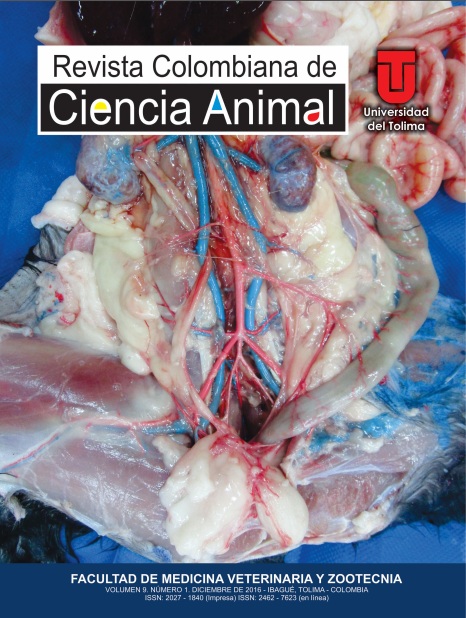Hernia diafragmática pleuroperitoneal congénita en un gato: Reporte de caso
Resumen
Las hernias diafragmáticas congénitas son un diagnóstico poco frecuente en la práctica clínica, posiblemente debido a una alta mortalidad neonatal; sin embargo, en aquellos animales que se ha diagnosticado suelen ser asintomáticos.
La presencia de ésta y otras dismorfias congénitas concomitantes y los riesgos anestésicos propios de éstas, como la hipotensión y las arritmias deben tenerse en cuenta en estos casos. El objetivo de este reporte de caso fue describir los hallazgos clínicos evidenciados en un gato mestizo de cuatro años de edad que presentó hernia diafragmática pleuroperitoneal congénita, y otras dismorfias concomitantes. A pesar de su baja incidencia es importante tener claro el abordaje clínico y terapéutico que se puede establecer en este tipo de pacientes.
Descargas
Citas
Bélanger, R., Shmon, C.L., Gilbert, P.J., Linn, K.A., 2014.
Prevalence of circumcaval ureters and double caudal vena
cava in cats. American Journal of Veterinary Research 75,
-95.
Cariou, M.P.L., Shihab, N., Kenny, P., Baines, S.J., 2009.
Surgical management of an incidentally diagnosed true
pleuroperitoneal hernia in a cat. Journal of Feline Medicine
and Surgery 11, 873.
Casteleyn, C., Cornillie, P., Van Cruchten, S., Ginneken, C.,
Left Retrocaval Ureter around the Ipsilateral Limb of a
Double Caudal Vena Cava in a Cat. Journal of Comparative
Pathology 152, 313-316.
Clarke, K. W., Trim, C. M., Hall, L. W., 2014. Veterinary
Anaesthesia, Eleventh Ed. Saunders Elsevier, Edinburgh,
London, New York, Oxford, Philadelphia, St Louis, Sydney,
Toronto, pp. 605-606
Clark-Price, S., 2015. Inadvertent Perianesthetic Hypothermia in
Small Animal Patients. Veterinary Clinics of North America:
Small Animal Practice 45, 983-994.
Feldman, D., 1968. Congenital diaphragmatic hernia in
neonatal dogs. Journal of the American Veterinary Medical
Association 153, 942.
Fossum, T.W., 2009. Cirugia en pequeños animales, Third Ed.
Elsevier, Barcelona, España.
Goh, B.K.P., Teo, M.C.C., Chng, S., Soo, K., 2007. Right-sided
Bochdalek’s hernia in an adult. The American Journal of
Surgery 194, 390–391.
Gramegna, V., Madaro, A., Pellegrini, F., Capizzi, S., Romano,
O., Massari, D., Liessi, G., 2003. A Rare Case of Retrocaval
Revista Colombiana de Ciencia Animal, Vol. 9, No. 1, 2016 51
Ureter Associated with Persistent Left Vena cava. Urologia
Internationalis 70, 333-338.
Greer, J.J., 2013. Current concepts on the pathogenesis and
etiology of congenital diaphragmatic hernia. Respiratory
Physiology & Neurobiology 189, 232– 240.
Hart, S.R., Bordes, B., Hart, J., Corsino, D., Harmon, D., 2011.
Unintended Perioperative Hypothermia. The Ochsner
Journal 11, 259-270.
Hensel, P., 2014. Treatment of Peritoneopericardial. Advances in
Small Animal Medicine and Surgery 27, 7-8.
Haraman, M.I., Gürdal, M., Öztürk, M., Kanberoglu, H., 2002.
Maternal Exposure to Diethylene Glycol Monomethyl Ether:
A Possible Role in the Etiology of Retrocaval Ureter. Journal
of Pediatric Surgery 37, 1-2.
King, L., 2004. Textbook of Respiratory Disease in Dogs and
Cats. Elsevier, St. Louis, Missouri.
Lally, K.P., Lasky, R.E., Lally, P.A, Bagolan, P., Davis, C.F.,
Frenckner, B.P., Hirschl R.M., Langham R.M., Buchmiller,
T.L., Usui, N., Tibboel, D., Wilson, J.M., 2013. Standardized
reporting for congenital diaphragmatic hernia – An
international consensus. Journal of Pediatric Surgery 48,
–2415.
Little, S. E., 2012. The cat: clinical medicine and management,
Saunders Elsevier, St. Louis, Missouri, USA.
Minihan, A.C., Berg, J., Evans, K.L., 2004. Chronic diaphragmatic
hernia in 34 dogs and 16 cats, J Journal of the American
Animal Hospital Association 40, 51-63
Parry, A., 2010. Positive contrast peritoneography in the
diagnosis of a pleuroperitoneal diaphragmatic hernia in a
cat. Journal of Feline Medicine and Surgery 23, 141-143.
Schmiedt, C.W., Tobias K.M., Stevenson, M.A.M., 2003.
Traumatic diaphragmatic hernia in cats: 34 cases (1991-2001). Journal of the American Animal Hospital Association
, 1237.
Silverstein, D., Hopper, K., 2015. Small Animal Critical Care
Medicine, Second Ed. Saunders Elsevier, California, USA.
Sivacolundhu, R., Read, R., Marchevsky., 2002. Hiatal hernia
controversies - a review of pathophysiology and treatment
opcions. Veterinary Journal of Australia 80, 48-53.
Valentine, B., Cooper, B., Dietze, A., Noden D.D., 1988. Canine
congenital diaphragmatic hernia. Journal of Veterinary
Internal Medicine 2, 109-112.
Mouly, J., Magallanes, V., 2012. Actualización en pancreatitis
aguda. Journal latinoamericano de Medicina Veterinaria de
emergencia y cuidados intensivos 4(4) 190-204.
Pleuvry, B.J., 2015. Physiology and pharmacology of nausea and
vomiting, Anaesthesia and intensive care medicine. http://
dx.doi.org/10.1016/j.mpaic.2015.06.018


